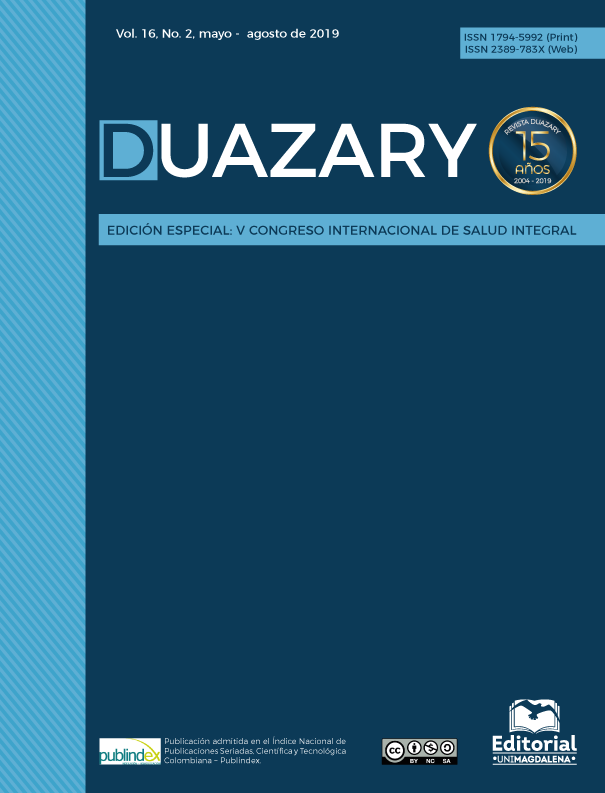Style of life and health: Community Hare Krishna of Santa Marta - Colombia
Main Article Content
Abstract
Hare Krishna are a group of people voluntarily gathered with the intention of leading a pure life and awakening the love for spirituality as their main purpose of life. The aim of this research is to describe and interpret the lifestyle of the Hare Krishna community and their vision for health. The ethnographic research was conducted in the second quarter of 2016, through observation and interviews with community members, a direct intervention was carried out, sharing with the community their daily activities, their food and their spiritual beliefs. For members of the community to find Krishna consciousness was their destiny, Krishna comes into their lives to fill their being fully. Changing their way of life was for them an act of surrender to the spiritual life, a renunciation of the material world and everything that could represent harm to their lives. Members of the Hare Krishna community feel that their lifestyle reflects superiority or a higher level within society. They believe that the principles that govern them are those that God in creating life wanted all his children to follow.
Downloads
Article Details
References
2. Fonseca-López V. El discurso Hare Krishna en internet. Aguas Calientes: Universidad Autonoma de Aguas Calientes; 2012.
3. Yogeshwar G. Swami vivekananda’s concept of jnana yoga, raja yoga, karma yoga and bhakti yoga. Ancient Science of Life. 1994; 13(3-4): 261-265.
4. Diario de Mendoza. Costumbres de rezo y vestimenta de los hare krishna», artículo en el Diario Uno. Menciona las ropas que utilizan los hare krishna; 2010. Disponible en: http://www.diariouno.com.ar/mendoza/costumbres-rezo-y-vestimenta-los-hare-krishnas-20100511-n180260.html
5. Guarín J. Percepción del cuerpo femenino. Mujeres de la comunidad Hare Krishna ISKCON Cali. Santiago de Cali: Universidad Del Valle; 2013.
6. Vallverdú J. Conversión, compromiso y construcción de identidad en el movimiento Hare Krisna. Alteridades.1999; 9(18): 57-70.
7. Reddy M. Psychotherapy - Insights from Bhagavad Gita. Indian Journal of Psychological Medicine. 2012; 34(1):100-104.
8. Notimerica. Los Hare Krishna, el movimiento religioso que se está expandiendo en Colombia; 2017. Disponible en: http://www.notimerica.com/sociedad/noticia-hare-krishna-movimiento-religioso-expandiendo-colombia-20160227185229.html
9. Mojica J. El paraíso de los krishnas, a solo una hora de Bogotá; 2017. Disponible en: http://www.eltiempo.com/archivo/documento/CMS-11215341
10. Goetz J, LeCompte M. Etnografía y diseño cualitativo en investigación educativa. Morata. España: Morata Editores; 1988.
11. Kawulich-Barbara B. La observación participante como método de recolección de datos. Forum: Qualitative Social Research. 2006; 6(2).
12. Real Academia Española. Diccionario de la lengua española (22°): Madrid, España; 2001. Disponible en: http://www.rae.es/
13. Organización de las Naciones Unidas. Declaración Universal de los Derechos Humanos, United Nations; 2008. Disponible en: http://www.ohchr.org/EN/UDHR/Documents/UDHR_Translations/spn.pdf
14. Fernández B. Matrimonio, exclusivo e inclusivo. Cuatro caminos; 2017. Disponible en: http://www.ciudadredonda.org/articulo/matrimonio-exclusivo-e-inclusivo-2.
15. Parker-pope T. El matrimonio es una ciencia. [Blog] Relaciones de pareja; 2010. Disponible en: http://www.semana.com/vida-moderna/articulo/el-matrimonio-ciencia/117269-3
16. Brignardello J, Heredia L, Paz Ocharán M, Durán S. Conocimientos alimentarios de vegetarianos y veganos chilenos. Revista chilena de nutrición. 2013; 40(2): 129-134.
17. Albero R, Sanz A, Playán J. Metabolismo en el ayuno. Endocrinología y Nutrición. 2004; 51(4):139-148.
18. Organización Mundial de la Salud. Informe sobre la salud en el Mundo 2003: forjemos el futuro. Ginebra: Organización Mundial de la Salud; 2003.
19. Vallverdú J. Movimientos religiosos e identidades juveniles. Hare Krishna en Occidente. Revista de Estudios de Juventud. 2001; 53(1): 57-71.
20. Cardona J. Sistema médico tradicional de comunidades indígenas Emberá-Chamí del Departamento de Caldas-Colombia. Salud pública. 2012; 14(4): 630-643

